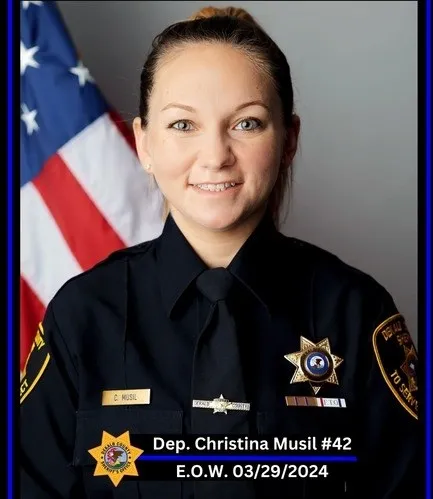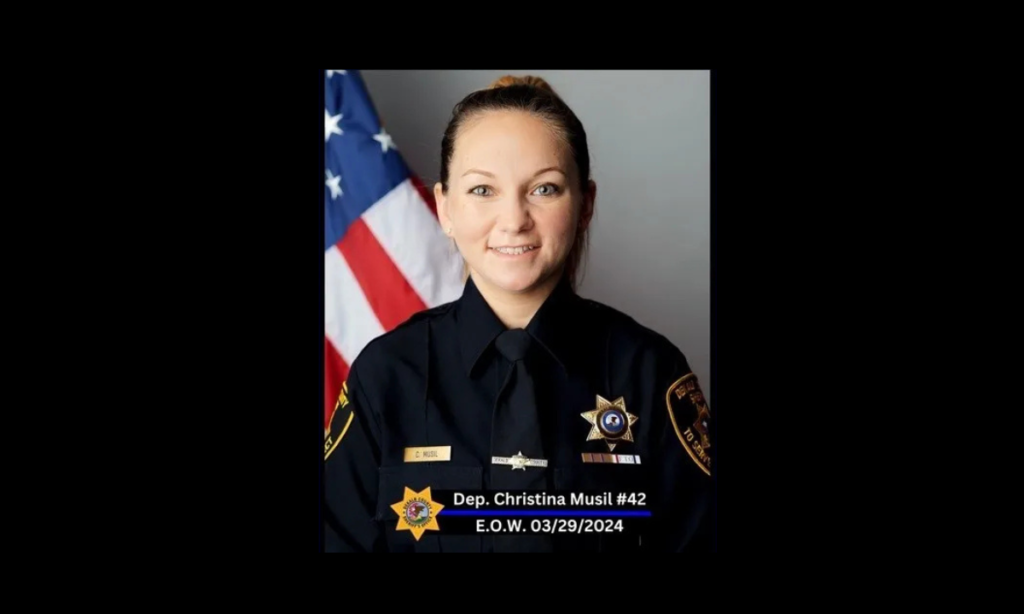By Beth Hundsdorfer, Capitol News Illinois
Four years before police said he caused a crash that killed a DeKalb County sheriff’s deputy, Nathan Sweeney pleaded guilty to driving under the influence and having 44 grams of heroin in his car – an offense that, if properly reported to the secretary of state, should have led to the revocation of his driver’s license and the loss of his commercial driving privileges.
But notification of those convictions never got to the secretary of state’s office. Instead, Sweeney struck a plea deal with Kane County State’s Attorney prosecutors that masked the convictions that would have triggered the license revocation, a practice prohibited by both state and federal law, according to Illinois Secretary of State Alexi Giannoulias. He’s now asking for a federal audit of Kane County.
“Given the alarming information gathered by my office, it has become abundantly clear that the system failed in keeping a clearly dangerous driver off the road,” Giannoulias wrote in a letter this week to the U.S. Department of Transportation Federal Motor Carrier Safety Administration that was obtained by Capitol News Illinois.
“The masking and plea agreement in Mr. Sweeney’s case are deeply troubling, leading to the obfuscation of his true driving record and obstruction of proper procedures, which created a danger on our roads.”
Illinois Secretary of State Alexi Giannoulias
“Masking” is a term used to describe a court action that allows holders commercial driver’s licenses, or CDLs, to avoid permanent marks on their record, even when convicted of serious driving-related crimes, by allowing the driver to participate in a diversion program or deferring imposition of judgment.
In the letter sent last week, Giannoulias called on the federal agency that regulates transportation issues including trucking to audit Kane County to determine whether other convictions have been masked and if the practice is still being used.
READ IT: Federal Motor Carrier Safety Administration Letter 11-25-24
“He should have been denied his ability to get behind the wheel – and would have – if the legal process was properly administered. We need transparency and accountability to not only keep people like Mr. Sweeney from operating a vehicle but to also prevent future tragedies from happening,” Giannoulias said in the letter.
Sweeney, 44, was behind the wheel of a Kenworth semitruck on March 28 when he struck the rear of DeKalb County Sheriff’s Deputy Christina Musil’s squad car parked on the shoulder of the road, according to a state police report. Musil died from her injuries.
Giannoulias’ office began looking into the status of Sweeney’s CDL after Musil’s death. The inquiry found evidence of Sweeney’s plea agreement with the Kane County State’s Attorney in a driving under the influence of drugs and a drug possession conviction in 2020 violated state and federal laws that prohibit masking.
On Feb. 27, 2020, Illinois State Police stopped Sweeney, who obtained his CDL in 2008, in Kane County while he was driving his personal car. An Illinois State Police trooper spotted Sweeney veering shoulder to shoulder in a 2000 Honda Civic, according to a police report.
Sweeney told the trooper he had not been drinking and a breathalyzer test revealed no alcohol, but he failed field sobriety tests. During a search, the trooper found a lunch box with six baggies inside the Civic.
He told police that the substance was heroin purchased in Chicago. Lab tests confirmed the baggies contained 44 grams of heroin.
Sweeney tested positive for heroin use. He was arrested and charged with DUI drugs, improper lane usage and operating an uninsured motor vehicle.
“Had the charges of his first DUI and possession of a controlled substance not been masked, his CDL would have been disqualified for life.
Illinois Secretary of State Alexi Giannoulias
On April 22, 2021, in an agreement with prosecutors, Sweeney entered a guilty plea.
Under the plea agreement, the conviction was withheld from his record for 18 months to allow him to complete the terms of his probation, including attending a victim impact panel and counseling. Upon satisfying those conditions, prosecutors allowed Sweeney to withdraw his guilty plea, and they dismissed the case. The plea agreement did allow Sweeney’s felony drug possession conviction to stand.
Under Illinois law, convictions must be reported to the secretary of state within five days.
Jamie Mosser, who became Kane County State’s Attorney in 2020, stated in an email that her office approved Sweeney’s plea agreement.

“The individuals involved in the decision of the plea also had to consider case circumstances that could have affected the office’s ability to obtain a conviction on all counts,” Mosser stated.
Even after the dismissal of the DUI charge, Giannoulias contended in his letter that the conviction should have been reported to his office because the drug possession occurred in a vehicle. That would have caused Sweeney’s CDL to be suspended for one year.
But the day after the plea, prosecutors and the defense agreed to amend the record. Both parties stated that the box checked on the guilty plea indicating that a motor vehicle was involved was checked in error.
“To the best of my recollection, my office decided not to object to the motion, deferring to the court as to whether to grant it,”
Kane County State’s Attorney Jamie Mosser
Kane County Judge Salvatore LoPiccolo signed the order. That conviction, too, went unreported.
In May 2021, LoPiccolo entered another order, specifically allowing Sweeney to travel throughout the U.S. on an ongoing basis for employment purposes while he was on probation. Prosecutors did not oppose the move.
“To the best of my recollection, my office decided not to object to the motion, deferring to the court as to whether to grant it,” Mosser said in her emailed response.
By Oct. 21, 2022, Sweeney completed the terms of his plea deal and withdrew his guilty plea on the DUI. As agreed, prosecutors dismissed the case.
“The masking and plea agreement in Mr. Sweeney’s case are deeply troubling, leading to the obfuscation of his true driving record and obstruction of proper procedures, which created a danger on our roads,” Giannoulias stated in letter.
“The plea agreement denies the Office of the Secretary of State its authority to properly execute laws meant to keep our roads and residents safe,” he added.
Two weeks after prosecutors dismissed the case, Sweeney drove his semi into the rear of another vehicle. Kane County Sheriff’s deputies cited him for following too closely. He pleaded guilty and paid a $164 fine.
Less than a year later, Sweeney was involved in another crash. He was not ticketed but he is facing a lawsuit as a result of the crash. Yadira Gonzalez and her child were in a car in DeKalb on Sept. 5, 2023, when Sweeney stopped to make a turn, then backed into her car, according to a lawsuit filed on behalf of Gonzalez in DeKalb County. Both Gonzalez and her child were injured.
In that lawsuit, Bradley Melzer, Gonzalez’s attorney, noted Sweeney’s guilty plea to the Kane County drug possession charge and named Sweeney’s employer, Garzo Tire, in the suit for failing to drug test Sweeney. The employer declined to comment.
“Sweeney’s incompetence, inexperience or recklessness was a proximate cause of the resulting crash,” Melzer stated in the petition.
Gonzalez asked for more than $50,000 in damages. Her lawsuit is still pending.
Four years after police stopped Sweeney for driving under the influence of heroin, he was behind the wheel of his Kenworth semitruck when he struck the rear of DeKalb County Sheriff’s deputy Christina Musil’s squad car that was parked on the shoulder of Illinois Route 23. It was 10:30 p.m. on March 28 when Sweeney left his lane, went onto the shoulder and struck Musil’s squad car from the rear with enough force to propel the car back into the roadway.

Musil was sent to a DeKalb hospital where she died from her injuries a few hours after the crash.
Musil had three children, 12, 11 and 5. She was an Army veteran who served in Afghanistan and served in the National Guard. At her funeral, friends called her “Beana” and called her a beacon of hope.
Immediately after the crash, Sweeney was ticketed for failing to reduce speed to avoid an accident, operating an uninsured motor vehicle and improper lane usage.
Upon completion of an investigation, the DeKalb County State’s Attorney’s Office charged Sweeney with three counts of aggravated DUI drugs causing death, and reckless homicide.
The case became a source of controversy when a DeKalb County judge ordered Sweeney’s release under the pretrial fairness, or SAFE-T Act, finding prosecutors did not show “clear and convincing evidence” that Sweeney posed a threat to the community.
The judge did impose conditions on Sweeney’s pretrial release, including barring him from operating a motor vehicle and requiring him to undergo drug testing to prove he is not on illegal or unprescribed drugs.
Sweeney remains free until trial. Efforts to reach him were unsuccessful.
Sweeney’s initial refusal to submit to testing for drugs at the time of the crash caused his CDL and Illinois license to be suspended for one year, but Giannoulis’ office administratively revoked Sweeney’s license to prevent it from being automatically reinstated. The possibility still exists that Sweeney could get his commercial driving privileges restored. That possibility would have been eliminated if the previous DUI conviction and drug possession would have been properly reported, according to Giannoulis.
“Had the charges of his first DUI and possession of a controlled substance not been masked, his CDL would have been disqualified for life. Because the Secretary of State’s office did not receive proper notification, Mr. Sweeney can apply for reinstatement after his current legal process concludes and the one-year CDL disqualification will automatically terminate,” Giannoulias wrote.









